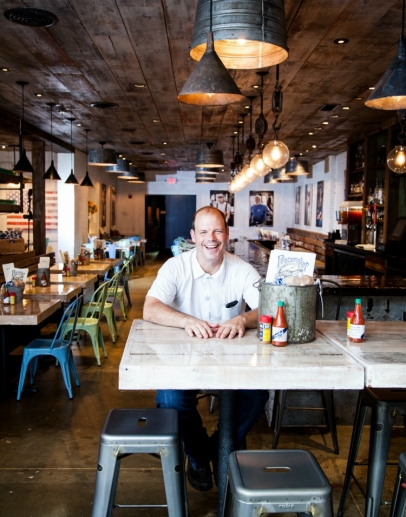The Accidental Chef: An Interview With Kevin Nashan
Chef Kevin Nashan recently won a James Beard award for Best Chef: Midwest 2017 and is the chef-owner of Sidney Street Café and The Peacemaker in St. Louis. Chef Nashan is one of the featured chefs at this year’s brand new Euphoria event “Big Easy Bash,” a NOLA-inspired party in Traveler’s Rest’s Trailblazer Park on September 23. Tickets are $85 and can be purchased online at euphoriagreenville.com.
Edible Upcountry: How has your cooking been variously influenced by all the great food cities you’ve lived in? Do you have a favorite food city?
Kevin Nashan: Every new city and new restaurant brings a new perspective to cooking. There’s things that New York can offer but New Orleans can’t, and vice versa. New Orleans had a huge impact on my cooking since it’s where I learned about Southern food, but its foundation is classic French technique. Also, growing up in New Mexico and then living in Spain was significant to my cooking style.
EU: So you’ve cooked for the likes of Barack Obama… What is the most meaningful experience you’ve had as a chef?
KN: Obama was probably my top of all time, but I recently started working with Gambrill Gardens, a retirement home in St. Louis to develop their food and beverage program, catering to the nutritional needs of the elderly residents. It’s a different way to approach cooking. The experience has given cooking a bigger meaning.
EU: You’ve said that sourcing locally should be “expected, not celebrated.” Are we getting closer to that reality? Can you comment on food trends in 2017, focusing on ways for individuals who aren’t in the food industry to make a positive impact as diners/consumers?
KN: I think we’re improving but we’re faced with a lack of small farmers to supply enough product for locally sourced ingredients to be in every restaurant. Customers are becoming more educated and are increasingly more interested in where the food is coming from but the proof is in the pudding—locally sourced ingredients mean better product and better flavor. You can’t use grocery store ingredients and get the same flavor.
EU: In one interview you said the care and flavor in food comes from the farmers and growers, and a chef’s job is just to try not to screw that up. How does this philosophy influence your cooking?
KN: We draw inspiration from our ingredients. Great ingredients are what drive our menu. You want a tomato to taste like a tomato. Start there and then get we great creative and have fun to create dishes.
EU: Chefs are notoriously unhealthy. What motivates you to live a healthy lifestyle? Is this harder in your line of work? How does your athletic training compare to your role in the kitchen?
KN: It’s tough, especially as you get older and you’re on your feet for 12 hours a day. You realize you can’t stay out all night and that you need to take care of yourself. When you’re taking care of yourself your food tastes better. I always was athletic growing up and played rugby in college. Once I got into cooking I decided to start training for Ironmans and challenging myself that way. (Rugby was a little too rough. I couldn’t look beat up all the time.) It’s really similar to cooking in that in pushes you and humbles you—you have great days and you have really bad days.
EU: Can you comment on the relationship between cooking simply and nutrition? How important is nutrition on your menus? Do chefs have an obligation to care about what their guests eat?
KN: Chefs definitely have an obligation to cook using the absolute best ingredients and put care into everything they give their guests. This means letting the ingredients shine and not relying on additives or extra butter and oil. When we find alternatives it ends up tasting so much more flavorful. For example, we make “creamed corn” without cream; the corn is cooked in its own juices.
EU: Do you have any pet peeves in the kitchen?
KN: A messy kitchen, and talking during service when there is a lull. I prefer a quiet kitchen.
EU: How would your kitchen staff describe you in three words?
KN: Focused, fun, creative!
EU: You grew up in restaurants. Were you “destined” to become a chef? If you weren’t a chef, what would you want to do?
KN: I loved food growing up and was always in my grandparents’ restaurant in New Mexico, but I never thought I’d be a chef. After college my brother and I wanted to open a restaurant and one of us needed to go to culinary school and I volunteered, then fell in love with it. If I weren’t a chef I’d want to be in the FBI or CIA—that’s what my grandfather did before opening his restaurant.
Photo by Jonathan Gayman





